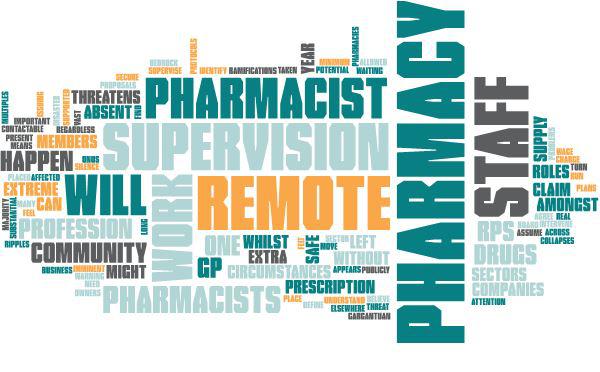The Responsible Pharmacist Will See You Now
13 Sep . 3 min read.

All pharmacists, regardless of which sector they work in, will be affected by the remote supervision proposals. The RPS has publicly supported the move following the recent GPhC consultation, and with silence from the current elected EPB board members, one can only be left to assume they agree with the plans. The RPS appears to believe that as long as substantial protocols are in place, and a pharmacist is contactable, then it is safe for the pharmacist to supervise, whilst absent from the pharmacy. It is important to understand that an absent pharmacist cannot intervene if they are away from the premises. The onus is placed on pharmacy staff to identify potential problems.
Remote supervision
Remote supervision in pharmacy means that pharmacy staff can run a pharmacy without a pharmacist being physically present. This is a disaster waiting to happen. The RPS claim that remote supervision will only happen under extreme circumstances – in an emergency for example, but do not define the extreme circumstances. It is left open to interpretation, which is dangerous.
Pharmacy chains are already openly abusing the two-hour absence of the responsible pharmacist regulation. It was originally intended to be used by the pharmacist to conduct clinical activities away from the pharmacy, but is now being used to allow other pharmacy staff to prepare medications before the pharmacist even arrives, or to keep the pharmacy premises open for GSL sales whilst the pharmacist is on their lunch break. Even worse, some chains coerce the pharmacist to stay on the premises during their lunch break, to allow dispensing to continue but do not pay the pharmacist during this time. The RP regulations are already being exploited for profit. Just imagine what will happen during an ’emergency situation’ where pharmacies will use the remote supervision regulation to justify opening a pharmacy without a pharmacist on site. The ramifications of this very real and imminent threat to the profession is gargantuan.
Concern for pharmacists working in other sectors
For those pharmacists who work in sectors other than community, who might feel secure in their roles, remote supervision should be taken as a warning. Community pharmacy is the bedrock of the profession and where the vast majority (~70%) of pharmacists work. If remote supervision is allowed to happen, the ripples will be felt across all sectors. After all, those 70% will need to find work elsewhere. Once community pharmacy collapses, and the multiples and business owners have minimum wage staff issuing prescription-only drugs, they will turn their attention to hospitals, GP surgeries and anywhere else that is feasible. Privatisation of the NHS is already happening, so it is only a matter of time before your GP, (remote) pharmacist, optician, dentist, nurse and physiotherapist etc are all contracted by a large multiple to treat you.
If this all seems far-fetched, take a look at what some companies are currently doing. Automation of the dispensing process, increased pressure from management to reach MUR/NMS targets, and encouraging managers to increase prescription volumes without providing extra staff to manage the extra work, amongst other things. Companies claim they do all this to stay open, but just cast your eyes over their profit margins.
Lack of qualifications by other pharmacy staff members
Remote supervision essentially gives control of supply of powerful and toxic drugs to staff who have the education equivalent to that required to work in fast food restaurants. A four-year degree, followed by one year pre-registration training, prepares pharmacists to appropriately prescribe over the counter remedies for minor ailments, and confidently challenge inappropriate prescribing amongst other roles. How will pharmacy staff be able to explain why a patient cannot have ibuprofen whilst they are taking methotrexate for example? More to the point, will pharmacy staff even know there is a severe interaction which requires pharmacist intervention?
Threat to the future of Pharmacy?
Remote supervision not only threatens the very existence of our profession, but it also threatens the wellbeing of the public and endangers patient safety. The RPS set up the code of ethics for pharmacists, yet the remote supervision proposals fly in the face of their own code. Whatever happened to making the patient your primary concern?
Would you trust a receptionist at your GP surgery to diagnose your condition? Why then, are we allowing or expecting pharmacy staff to accurately oversee the safe and appropriate supply of drugs to some of the most vulnerable members of our society?
Written by our guest blogger, The Responsible Pharmacist aka @TheResPharm on Twitter